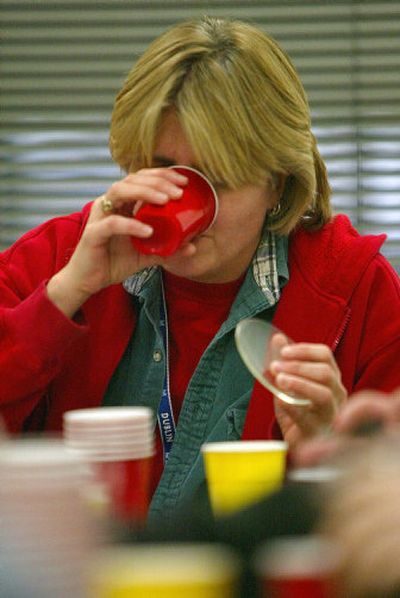Odorless, colorless, flavorless

SEATTLE – They sniff, swirl, sip and spit. They don’t look for complexity and body; they look for nothing. This isn’t vintage wine. It’s humble tap water.
The tasting panel, a group of six Seattle Public Utilities employees and one of about 50 tasting panels in the country, plays a key role in assessing post-treatment water quality. The more the water tastes like nothing in particular, the better for discerning customers.
Water tasters have proved a helpful check-and-balance for a system that some environmental groups regard as one of the best in the country. The tasters save laboratory test costs and reassure customers, officials say.
“Taste and odor are not safety issues, they are not health issues,” Moya Joubert, who heads the tasting panel, told the Seattle Post-Intelligencer. “We need and want to send out water that is acceptable to people.”
The tasting panel is made up of experts who had to pass “scratch and sniff” tests to make the team, then had further training.
As they sip, the tasters fill out a flavor profile analysis, assessing odor, taste, aftertaste and mouth feel, using a vocabulary akin to wine-tasters.
“I’m tasting fishy,” one member of the panel said at a recent tasting. “Grassy. Earthy.”
They taste water from various sources: different watersheds, untreated water and blends. And they know how to spot a winner.
“This is a one; it’s good – very good,” said taster Stacia Thomas.
On rare occasions, the panel will identify an unacceptable taste or odor that prompts the utility to drain and clean a reservoir, said Seattle Public Utilities’ Wylie Harper.
New Environmental Protection Agency rules require water systems to monitor for much more than taste. Now, public utilities must monitor closely for outbreaks of dangerous pathogens, such as Cryptosporidium, and address drinking-water disinfection.
Seattle, with watersheds protected from development and recently updated ultraviolet treatment plants, anticipated the new EPA rules. The city is already in compliance and is one of only a few in the country that the EPA does not require to build a plant to filter water.
“Seattle is widely viewed as having the best-protected watershed in the country,” said Eric Olson of the Natural Resources Defense Council, an environmental watchdog group. “Seattle has some of the better tap water in the country.”